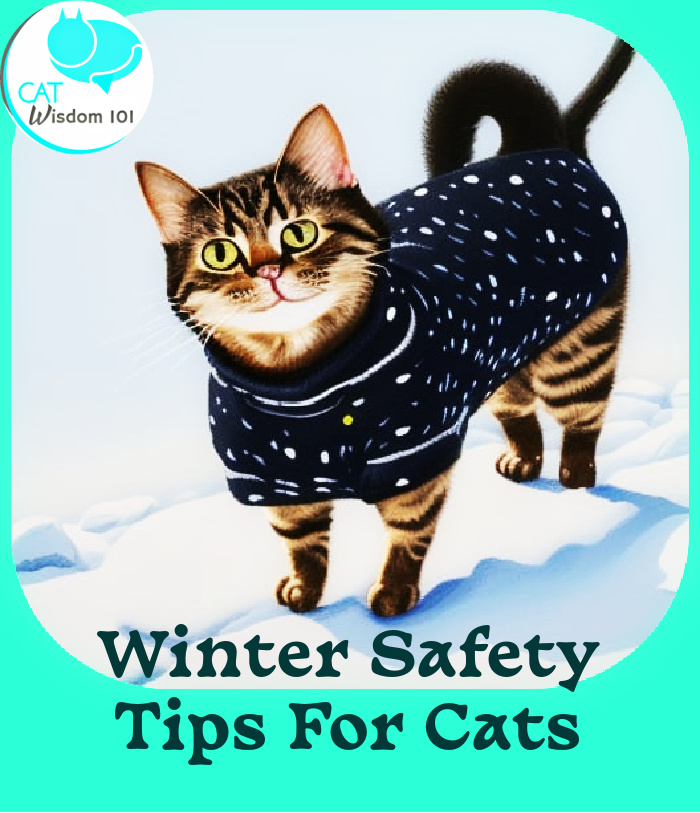
7 Winter Safety Tips For Happy, Healthy Cats
7 Winter Safety Tips For Happy, Healthy Cats by Layla Morgan Wilde. Published exclusively at Cat Wisdom 101.
Winter is a time for cozy nights by the fireplace, hot cocoa, and fun in the snow. However, for pets, winter weather can pose serious health and safety hazards. As a pet owner, it’s your responsibility to ensure that your furry friend stays safe, warm, and protected during the colder months. Enjoy these 7 winter safety tips.
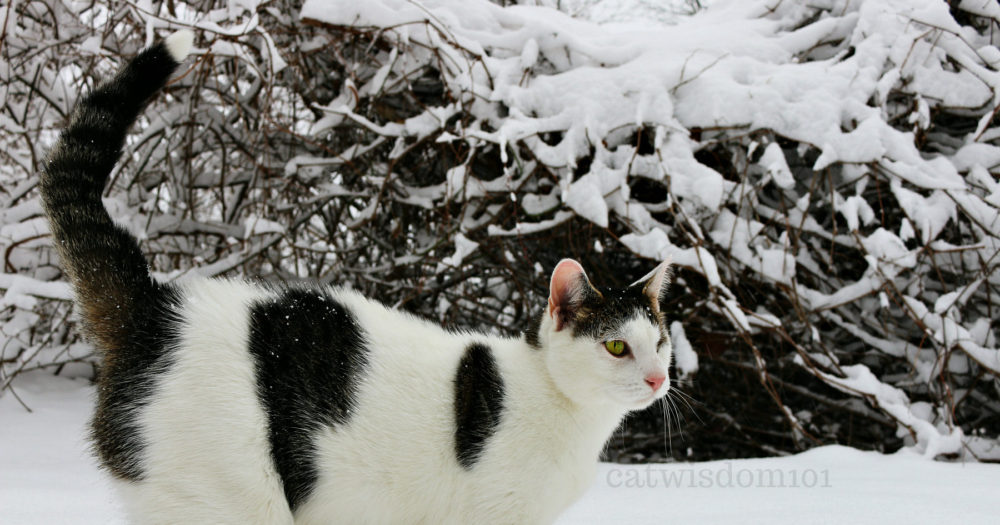
We’ve had a fairly mild winter here in Westchester County, NY but the temperature suddenly plunged below zero for the first time in three years. Odin, my fearless adventure cat goes out all year round. He loves the snow. Today he bolted out the door as usual but wanted to come back inside after 5 minutes. I immediately thought of other pets and the extra care needed in cold weather.
Please, you see a cat or dog that is being neglected outdoors, don’t hesitate to contact your local ASPCA or local animal control agency as soon as possible. In the U.S. dial 9-1-1 if you’re unfamiliar with local organizations.

Here are my winter cold weather safety tips this year for pet cats.
1. Provide Warm Shelter and limit outdoor time: Avoid Hypothermia. Make sure your cat has a warm, dry place to rest, especially if they are outdoor cats. Provide a heated bed or box with a soft, warm blanket or bedding. If you have an outdoor cat, consider constructing a heated outdoor shelter. While cats love to explore, it’s best to limit their outdoor time during extremely cold weather. If you have an outdoor cat, check on them frequently to make sure they are safe and warm. If you notice any signs of hypothermia, such as shivering, lethargy, or shallow breathing, bring them inside immediately.
2. Keep Them Hydrated: Water is essential to a cat’s health and survival, even in winter. Make sure your cat has access to fresh water at all times, and monitor their drinking habits. If you notice your cat is drinking less, it could be a sign of a health issue. Try adding a little warmed chicken broth to their water. Clean bowls well.
3. Avoid Anti-Freeze: Anti-freeze is a common cause of pet poisoning in winter. It contains ethylene glycol, which is toxic to cats and can be fatal if ingested. Keep all anti-freeze products, as well as any other toxic substances like salt used on sidewalks, out of reach of your pets. Use non-toxic products.
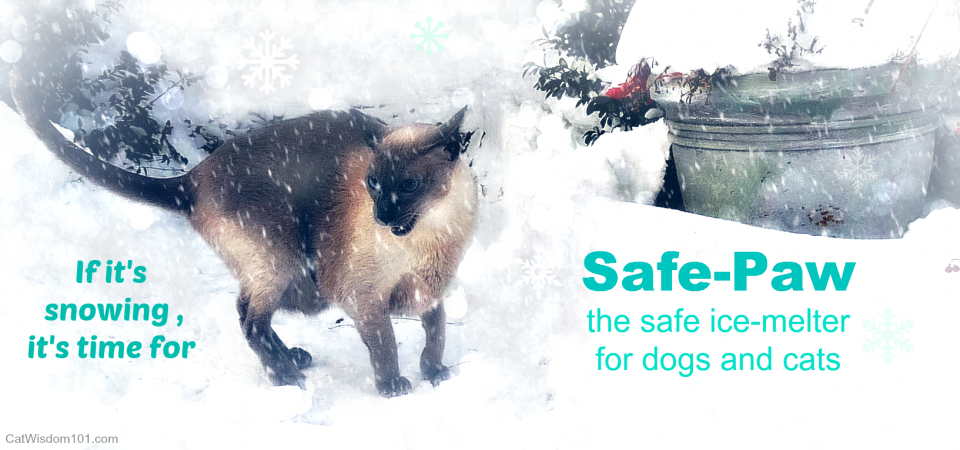
4. Keep Them Groomed: Regular grooming is essential to keep your cat’s fur healthy and free of tangles, mats, and ice balls. Trim the fur around their paws, and make sure their paws are clean and dry after they come inside. This will help prevent frostbite and other cold-related injuries. Cat paws are very sensitive. If dry or irritated, apply a dab of coconut oil. It’s safe and healthy even if licked off.
5. Monitor Their Eating Habits: Some cats may experience decreased appetite during the winter months, which can be a sign of illness, stress or boredom. Keep an eye on their eating habits and monitor their weight to ensure they are getting enough nutrition. For bored cats see my 10 Ways to Beat the Feline Winter Blues
6.Protect Them from the Elements: Hello, it’s sweater time! If your cat spends any time outsid, make sure they are protected from the elements. Provide them with a warm coat or blanket, and make sure their bed is positioned away from drafty doors or window.
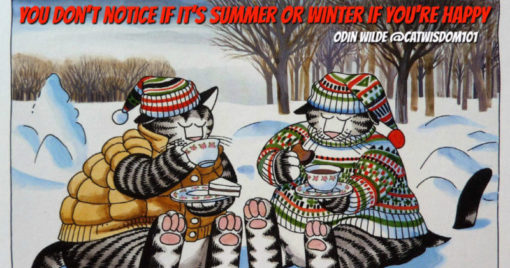
7. Winter Wellness Vet Visits: Regular vet visits are important for pet health and wellness, especially during the winter months. Your vet can help you determine if your cat is in good health, and can also provide additional tips for keeping them safe and warm during the winter months.
In conclusion, with a little bit of extra care, you can help keep your pet cat safe and healthy during the winter months. By providing them with warm shelter, keeping them hydrated, avoiding anti-freeze, limiting their outdoor time, grooming them regularly, monitoring their eating habits, protecting them from the elements, and making regular vet visits, you can ensure that your furry friend stays happy, healthy, and warm all winter long.
May I also suggest Easy Ways To Help Homeless Cats In Winter
A handy, shareable graphic!
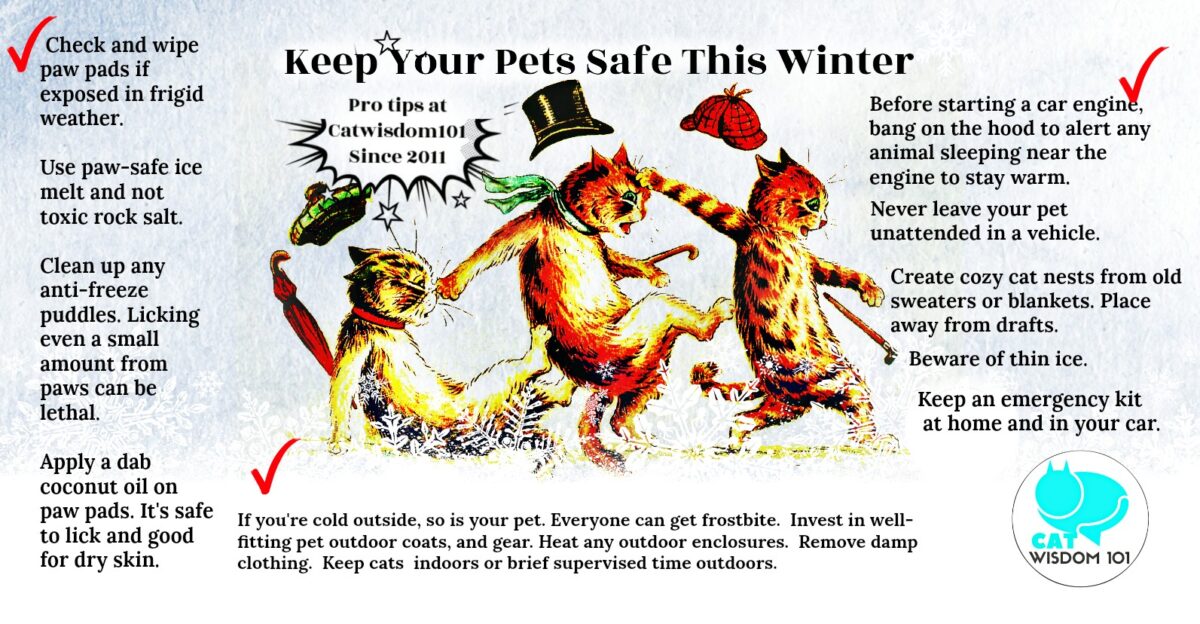



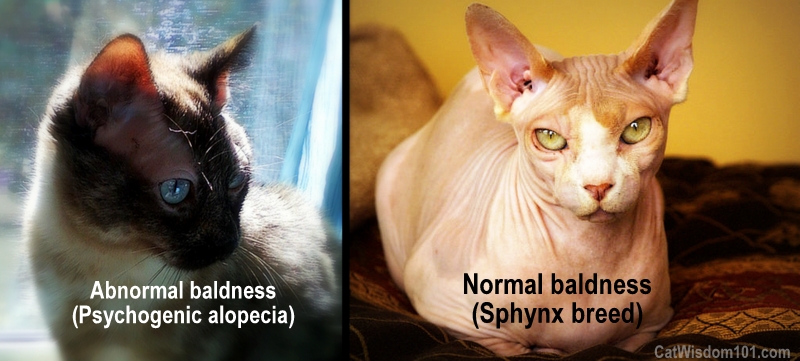


11 Comments
Skeeter and Izzy
Great reminders and tips!!!!
Luvs the kittehs drinking their hot drink (catnip tea mayhap) and eating their sandwiches wuile dressed in their finest goose down vests!!!!
Stay safe and warm and dry!
Luvs
Skeeter and Izzy and the Feral Gang and the Angels >^..^^..^<~
Pingback:
meowmeowmans
These are great tips, Layla. Thank you for the reminders. Despite last night’s/today’s brutal temperatures, it’s been a pretty mild winter for us, too. Still. we are happy that Ava is a strictly indoor cat.
Amy Harlib
Enjoyed the illustrations too!
Amy Harlib
Great advice! Luckily my Astor is a NYC apartmant indoor kitty who never goes out so I have to keep him excited with toys and attention!
Memories of Eric and Flynn
That is great advice and lovely illustrations.
Ellen J Pilch
Great tips and I love all the artwork. XO
Meezer'sMews&TerrieristicalWoofs
Much of this applies to pups as well.
Our Minko and before him our Toki were ‘get out the door if we can squueeze by’ …well, they would escape in the winter and then look totally confused by the snow…stand there like statues not knowng how to move, etc…so after a few seconds of gigglng, I would have to go ousiide to pick them up and ‘rescue’ htem. Toki even got stuck in a bg drift; he had jumped off the porch, thinking the ground had risen up to make it so he didn’t have to use the steps, LOL!!
We mostly only use coarse sand to reduce the slippery spots on our walk, salt, of a pet safe kind is only used sparingly and only when really needed.
Meezer'sMews&TerrieristicalWoofs
Some of those images you showed are amazing and wonderful some sure gave me the creeps.
Soo maybe it might work oor become popular, bu what about peeps like me who take an image of someone’s beloved furry one and turn it into a memento, layer upon layer until the desired effect is accomplished? (Which takes hours sometimes…) I don’t think AI could do the things I would like.
Layla Wilde
You’re right, no one AI could duplicate your loving work.
Brian Frum
Those are good tips. It has been a brutal winter in lots of places, we’ve been lucky here.